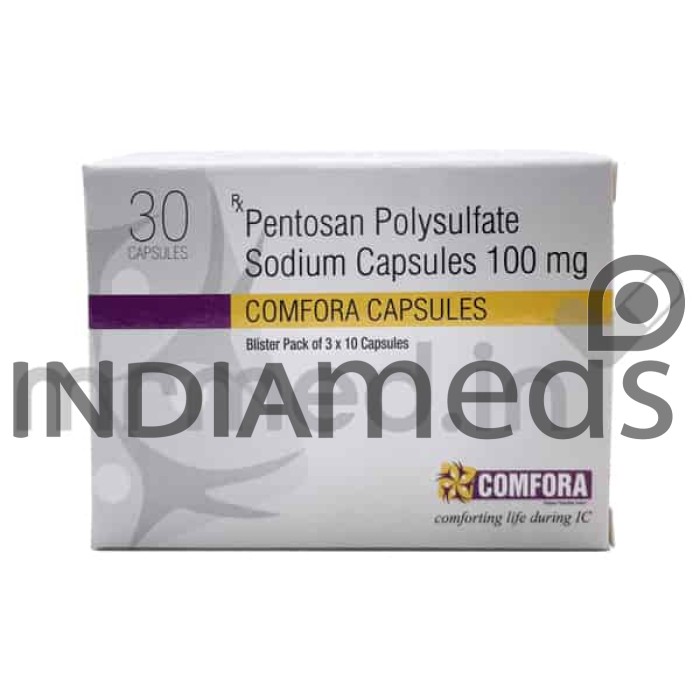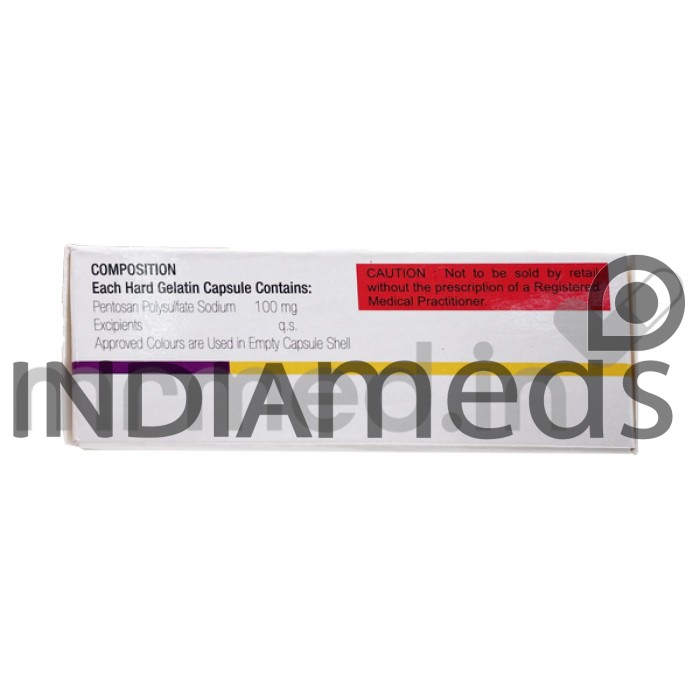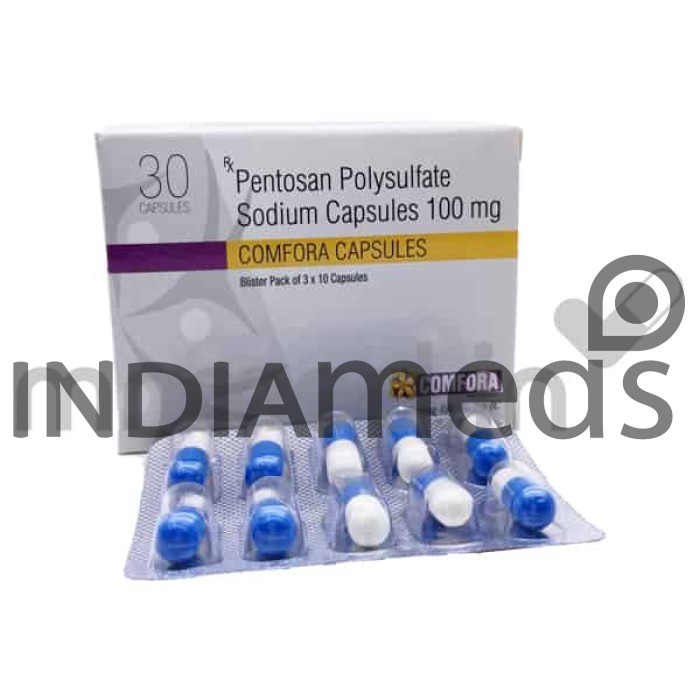Comfora 100mg capsule contains an active component called Pentosan polysulfate sodium. It is primarily known for treating interstitial cystitis or painful bladder syndrome, a chronic condition that causes pain and discomfort in the bladder and pelvis. It is believed to form a protective coating on the bladder lining, helping to reduce irritation and inflammation. This protective effect may contribute to its efficacy in managing IC symptoms. It is thought to have anti-inflammatory and cartilage-protective properties. It has anticoagulant properties and has been studied for its potential use in preventing blood clots. It may be considered a preventive measure in individuals at risk of DVT (Deep vein thrombosis) or PE (Pulmonary Embolism), especially in cases where other anticoagulants are unsuitable. It may be used in the management of bladder pain syndrome symptoms.
It should not be used in individuals with known hypersensitivity or allergy to Comfora 100mg capsule or its components. It has anticoagulant properties and can increase the risk of bleeding. It should be avoided in individuals with active bleeding disorders, such as hemophilia, thrombocytopenia( low platelet count in the blood.), or other bleeding tendencies. It should not be initiated immediately following major surgical procedures or spinal puncture because of its anticoagulant effects, which could increase the risk of bleeding at the surgical site or spinal canal. It is primarily eliminated through the kidneys. Therefore, caution is advised in individuals with severe renal impairment, as impaired kidney function can affect the drug's clearance from the body. Safety and effectiveness in pediatric patients below the age of 16 years have not been established. Regular monitoring and dose adjustments should be considered in older individuals before taking Comfora 100mg capsule if necessary.
- Interstitial cystitis
- Painful bladder syndrome
Therapeutic Effects of Comfora 100mg Capsule
Pregnancy
Due to limited safety data, Comfora 100mg capsule is generally not recommended during pregnancy. The potential risks to the fetus should be carefully weighed against the expected benefits, and its use should be discussed with a healthcare provider.
Breast Feeding
It is unclear whether Comfora 100mg capsule passes into breast milk, and the potential risks to the nursing infant are poorly understood. Breastfeeding women should consult with a healthcare provider before using this medication.
Lungs
No specific contraindication related to lung health exists. However, individuals with respiratory conditions should consult a healthcare provider, as there may be a risk of bleeding that could affect lung function.
Liver
Individuals with liver conditions should consult with their healthcare provider before taking Comfora 100mg capsule.
Alcohol
Alcohol consumption should be moderated, especially in older adults, as excessive alcohol intake can increase the risk of bleeding and may increase Comfora 100mg capsule-related side effects. Consult a healthcare provder before taking this medication with alcohol.
Driving
Comfora 100mg capsule is not known to impair the ability to drive or operate machinery. However, individual responses to medications can vary, so individuals should consult a healthcare provider before taking this medication while driving.
Serious
- Bleeding disorders
- Liver damage
- Allergic reactions
Common
- Gastrointestinal disturbances
- Headache
- Unusual taste
Following your healthcare provider's recommendations regarding the duration of Comfora 100mg capsule treatment duration is essential. Stopping the medication abruptly may lead to a recurrence of symptoms.
While there are no specific dietary restrictions are associated with Comfora 100mg capsule, some individuals with IC find that certain foods and beverages can trigger or worsen their symptoms. Discuss dietary considerations with your healthcare provider.
If you miss a dose of Comfora 100mg capsule, take it as soon as you remember. However, if it is close to the time for your next scheduled dose, skip the missed dose and continue with your regular dosing schedule. Do not double the dose to make up for a missed one.
Comfora 100mg capsule has anticoagulant properties and may be considered in specific medical situations for preventing blood clots. However, a healthcare provider should determine its use for this purpose.
Comfora 100mg capsule is typically available by prescription, and its use should be supervised by a healthcare provider who can assess your specific medical needs.
If you experience severe side effects or signs of an allergic reaction (e.g., rash, swelling, difficulty breathing) to Comfora 100mg capsule, seek immediate medical attention and discontinue the medication
Molecule name: Pentosan polysulfate sodium | Therapeutic class: Bladder protectants |
Pharmacological class: Heparinoid anticoagulants | Indications: 1. Interstitial cystitis 2. Painful bladder syndrome |







